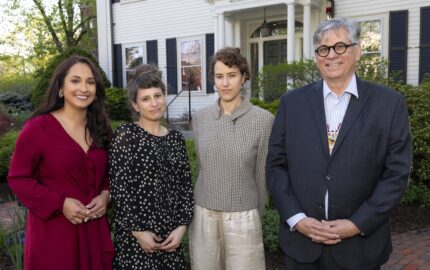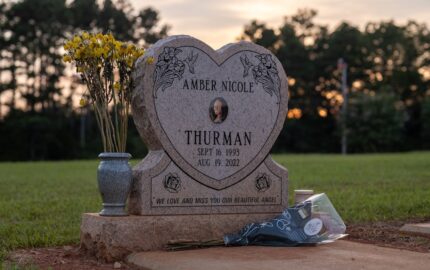CAMBRIDGE, Mass. – Reporter Michael J. Berens of The Seattle Times is winner of the 2010 Worth Bingham Prize for Investigative Journalism for his comprehensive six-part series “Seniors for Sale: Exploiting the aged and frail in Washington’s adult family homes.”
During his investigation, Berens found that thousands of vulnerable elderly adults had been abused, neglected or exploited for profit in many of Washington’s more than 2,800 adult family homes. He also discovered an underlying cause for his findings: Caseworkers trying to meet quotas were transferring nursing home residents into the homes to reduce the state’s Medicaid costs and save money.
The $20,000 Bingham Prize will be presented at the Nieman Foundation for Journalism at Harvard in Cambridge, Mass., on April 14, 2011.
In selecting “Seniors for Sale” as the Bingham Prize winner, judges praised the series for its outstanding enterprise reporting and for the crucial public service it provided. They recognized the many obstacles Berens had to overcome to tell the story properly — from dealing with victims who were deceased, suffering from dementia or otherwise not accessible — to obtaining records from officials unwilling to comply with information requests.
Bingham Prize judge Anna Gorman said “Berens combined data analysis with old-fashioned reporting to investigate an industry that has grown rapidly without sufficient oversight. Berens wrote about egregious mistreatment of seniors, including people being ‘strapped to chairs’ and ‘drugged into submission.’ But he also uncovered something perhaps even more shocking — the fact that homeowners were trying to sell seniors as part of real estate deals … While reporters frequently only focus on the problems, Berens also took readers inside an adult family home that works. Other news outlets across the nation should follow the paper’s lead and investigate the adult-home industry in their own states.”
Berens' work was exhaustive. He interviewed more than 250 people for the series; filed almost 50 state public-records requests to obtain more than 15,000 pages of documents; acquired and analyzed computer databases and thousands of pages of disciplinary actions from Washington’s Department of Social and Health Services (DSHS); and created a database listing adult-family-home enforcement actions from 1995 through 2009. Along the way, DSHS repeatedly provided false information or refused to respond to requests from the paper. However, in response to an open-record lawsuit filed by The Seattle Times, DSHS lawyers admitted that the agency had failed to disclose thousands of pages of e-mails to Berens.
The Seattle Times’ series in print was accompanied online by video interviews with key players, a directory of the state’s adult family homes, resources for readers including information on how to choose a home or report abuse, a profile of an adult family home that works, and a searchable database of adult home violations, which was compiled by Berens.
The reports generated strong reader response and, according to executive editor David Boardman, have led to important reforms: adult-home owners must publicly post inspection reports and violations, the state now lists all enforcement actions on its website, and DSHS reports all cases of suspected abuse and neglect in King County (Seattle) to law enforcement. Additionally, the director of the state department that oversees adult family homes was demoted and an adult-home owner and a caregiver profiled in the series have been sentenced to jail. Boardman says that the paper plans to continue reporting on issues related to long-term care for seniors.
Judge Walter Robinson noted “Though the paper’s staff is substantially smaller because of the economic travails of the news business, its commitment to major investigative projects remains undiminished. There is no better example than its groundbreaking series on the widespread abuse of the elderly and the shocking lack of government oversight in Washington’s attempt to place the burden for caring for infirm elderly citizens in the hands of the owners of nearly 3,000 private homes. Once again, a newspaper that cares deeply about the citizens it serves forced a government that had neglected its own caregiving role to move quickly to bring an end to the abuses.”
Amy Nutt, who served as a Bingham judge both this year and last, said “Reporter Michael Berens ripped open the hidden, but highly profitable world of adult family homes, a housing alternative to elderly care that is spreading across the country as states seek to relieve themselves of their Medicaid burden. Berens’ persistence laid bare not only abuses at numerous elder care homes but lax, even negligent oversight by the state’s department of health.”
Nutt added “The investigative work being done by both large and small media outlets, in newsprint and online, has never been higher … This year’s pool of stories reveals how effective investigative reporting can be when new tools for computer-assisted reporting allow media outlets to make their findings available to anyone with a computer or a smart phone.”
The team behind the series included reporter Berens; photographer Alan Berner; multimedia producer Genevieve Alvarez; editor James Neff; desk editors Laura Gordon, Carole McClosky and David Rea; photo editor Fred Nelson; print designer Bob Warcup; graphic designers Aldo Chan and Mark Nowlin; supervising producer Tiffany Campbell; web designer/developer Amy Richardson; and researchers David Turim and Gene Balk. Danny Gawlowski, April Simpson and Erika Riggs provided additional production support. Data analysis was done by Berens and Justin Mayo.
Judges for this year’s prize were Anna Gorman, a staff writer for the Los Angeles Times and a 2011 Nieman Fellow; Amy Nutt, a staff writer for The Star-Ledger in New Jersey and a 2005 Nieman Fellow; and Walter Robinson, a professor of journalism at Northeastern University who spent more than 30 years at The Boston Globe as both a reporter and editor specializing in political and investigative stories.
Two additional 2011 Nieman Fellows, Michael Fitzgerald, a freelance reporter based in the Boston area, and Deb Price, Washington correspondent for The Detroit News, assisted the judges in the selection process.
The Worth Bingham Prize honors investigative reporting of stories of national significance where the public interest is being ill-served. Prize judges are guided by such factors as obstacles overcome in getting information, accuracy, clarity of analysis and writing style, magnitude of the situation, and impact on the public, including any reforms that may have resulted.
Worth Bingham, who died at the age of 34, achieved prominence as an investigative journalist and was vice president and assistant to the publisher for the Louisville Courier-Journal. His family and friends created the prize in his memory in 1967. He was a 1954 Harvard University graduate.
Established in 1938, the Nieman Foundation for Journalism at Harvard administers the oldest midcareer fellowship program for journalists in the world. Grants are awarded to accomplished professionals who come to Harvard for a year of study, seminars and other special events. More than 1,300 journalists from 90 countries have received Nieman Fellowships. The foundation’s other programs include Nieman Reports, an influential quarterly written by and for journalists that examines journalism’s core challenges and opportunities; Nieman Watchdog, a project that encourages journalists to monitor and hold accountable all those who exert power in public life; Nieman Journalism Lab, an innovative online collaborative that identifies emerging business models and best practices in journalism in the digital media age; and Nieman Storyboard, a website that showcases exceptional narrative journalism in every medium and explores the future of nonfiction storytelling.
During his investigation, Berens found that thousands of vulnerable elderly adults had been abused, neglected or exploited for profit in many of Washington’s more than 2,800 adult family homes. He also discovered an underlying cause for his findings: Caseworkers trying to meet quotas were transferring nursing home residents into the homes to reduce the state’s Medicaid costs and save money.
The $20,000 Bingham Prize will be presented at the Nieman Foundation for Journalism at Harvard in Cambridge, Mass., on April 14, 2011.
In selecting “Seniors for Sale” as the Bingham Prize winner, judges praised the series for its outstanding enterprise reporting and for the crucial public service it provided. They recognized the many obstacles Berens had to overcome to tell the story properly — from dealing with victims who were deceased, suffering from dementia or otherwise not accessible — to obtaining records from officials unwilling to comply with information requests.
Bingham Prize judge Anna Gorman said “Berens combined data analysis with old-fashioned reporting to investigate an industry that has grown rapidly without sufficient oversight. Berens wrote about egregious mistreatment of seniors, including people being ‘strapped to chairs’ and ‘drugged into submission.’ But he also uncovered something perhaps even more shocking — the fact that homeowners were trying to sell seniors as part of real estate deals … While reporters frequently only focus on the problems, Berens also took readers inside an adult family home that works. Other news outlets across the nation should follow the paper’s lead and investigate the adult-home industry in their own states.”
Berens' work was exhaustive. He interviewed more than 250 people for the series; filed almost 50 state public-records requests to obtain more than 15,000 pages of documents; acquired and analyzed computer databases and thousands of pages of disciplinary actions from Washington’s Department of Social and Health Services (DSHS); and created a database listing adult-family-home enforcement actions from 1995 through 2009. Along the way, DSHS repeatedly provided false information or refused to respond to requests from the paper. However, in response to an open-record lawsuit filed by The Seattle Times, DSHS lawyers admitted that the agency had failed to disclose thousands of pages of e-mails to Berens.
The Seattle Times’ series in print was accompanied online by video interviews with key players, a directory of the state’s adult family homes, resources for readers including information on how to choose a home or report abuse, a profile of an adult family home that works, and a searchable database of adult home violations, which was compiled by Berens.
The reports generated strong reader response and, according to executive editor David Boardman, have led to important reforms: adult-home owners must publicly post inspection reports and violations, the state now lists all enforcement actions on its website, and DSHS reports all cases of suspected abuse and neglect in King County (Seattle) to law enforcement. Additionally, the director of the state department that oversees adult family homes was demoted and an adult-home owner and a caregiver profiled in the series have been sentenced to jail. Boardman says that the paper plans to continue reporting on issues related to long-term care for seniors.
Judge Walter Robinson noted “Though the paper’s staff is substantially smaller because of the economic travails of the news business, its commitment to major investigative projects remains undiminished. There is no better example than its groundbreaking series on the widespread abuse of the elderly and the shocking lack of government oversight in Washington’s attempt to place the burden for caring for infirm elderly citizens in the hands of the owners of nearly 3,000 private homes. Once again, a newspaper that cares deeply about the citizens it serves forced a government that had neglected its own caregiving role to move quickly to bring an end to the abuses.”
Amy Nutt, who served as a Bingham judge both this year and last, said “Reporter Michael Berens ripped open the hidden, but highly profitable world of adult family homes, a housing alternative to elderly care that is spreading across the country as states seek to relieve themselves of their Medicaid burden. Berens’ persistence laid bare not only abuses at numerous elder care homes but lax, even negligent oversight by the state’s department of health.”
Nutt added “The investigative work being done by both large and small media outlets, in newsprint and online, has never been higher … This year’s pool of stories reveals how effective investigative reporting can be when new tools for computer-assisted reporting allow media outlets to make their findings available to anyone with a computer or a smart phone.”
The team behind the series included reporter Berens; photographer Alan Berner; multimedia producer Genevieve Alvarez; editor James Neff; desk editors Laura Gordon, Carole McClosky and David Rea; photo editor Fred Nelson; print designer Bob Warcup; graphic designers Aldo Chan and Mark Nowlin; supervising producer Tiffany Campbell; web designer/developer Amy Richardson; and researchers David Turim and Gene Balk. Danny Gawlowski, April Simpson and Erika Riggs provided additional production support. Data analysis was done by Berens and Justin Mayo.
Judges for this year’s prize were Anna Gorman, a staff writer for the Los Angeles Times and a 2011 Nieman Fellow; Amy Nutt, a staff writer for The Star-Ledger in New Jersey and a 2005 Nieman Fellow; and Walter Robinson, a professor of journalism at Northeastern University who spent more than 30 years at The Boston Globe as both a reporter and editor specializing in political and investigative stories.
Two additional 2011 Nieman Fellows, Michael Fitzgerald, a freelance reporter based in the Boston area, and Deb Price, Washington correspondent for The Detroit News, assisted the judges in the selection process.
The Worth Bingham Prize honors investigative reporting of stories of national significance where the public interest is being ill-served. Prize judges are guided by such factors as obstacles overcome in getting information, accuracy, clarity of analysis and writing style, magnitude of the situation, and impact on the public, including any reforms that may have resulted.
Worth Bingham, who died at the age of 34, achieved prominence as an investigative journalist and was vice president and assistant to the publisher for the Louisville Courier-Journal. His family and friends created the prize in his memory in 1967. He was a 1954 Harvard University graduate.
Established in 1938, the Nieman Foundation for Journalism at Harvard administers the oldest midcareer fellowship program for journalists in the world. Grants are awarded to accomplished professionals who come to Harvard for a year of study, seminars and other special events. More than 1,300 journalists from 90 countries have received Nieman Fellowships. The foundation’s other programs include Nieman Reports, an influential quarterly written by and for journalists that examines journalism’s core challenges and opportunities; Nieman Watchdog, a project that encourages journalists to monitor and hold accountable all those who exert power in public life; Nieman Journalism Lab, an innovative online collaborative that identifies emerging business models and best practices in journalism in the digital media age; and Nieman Storyboard, a website that showcases exceptional narrative journalism in every medium and explores the future of nonfiction storytelling.


